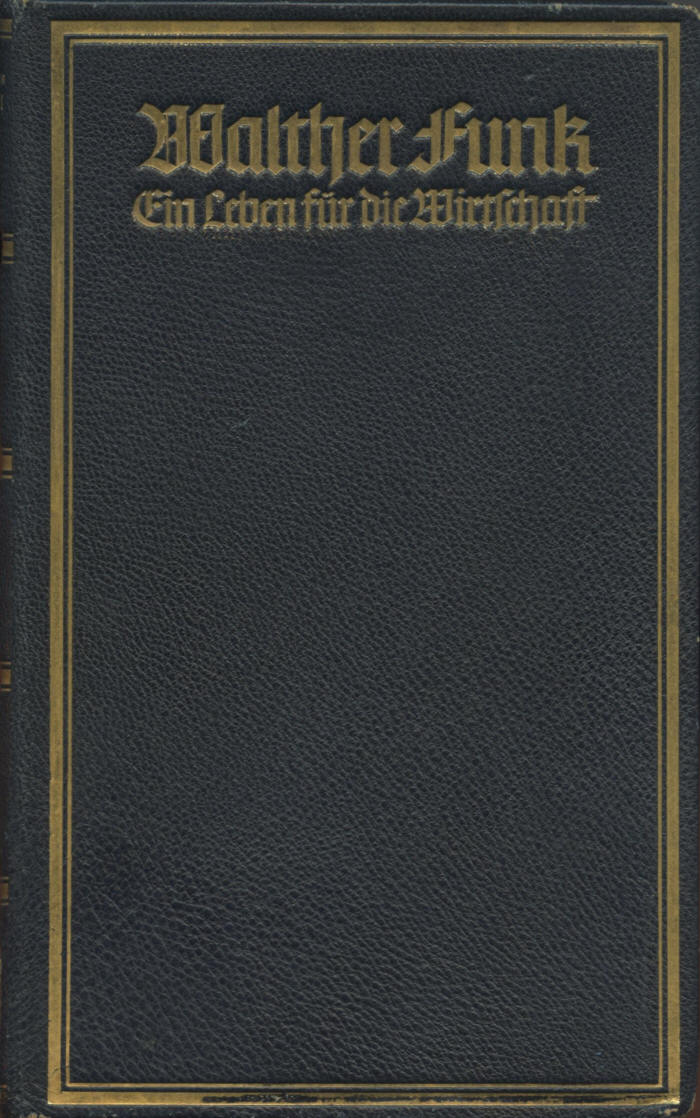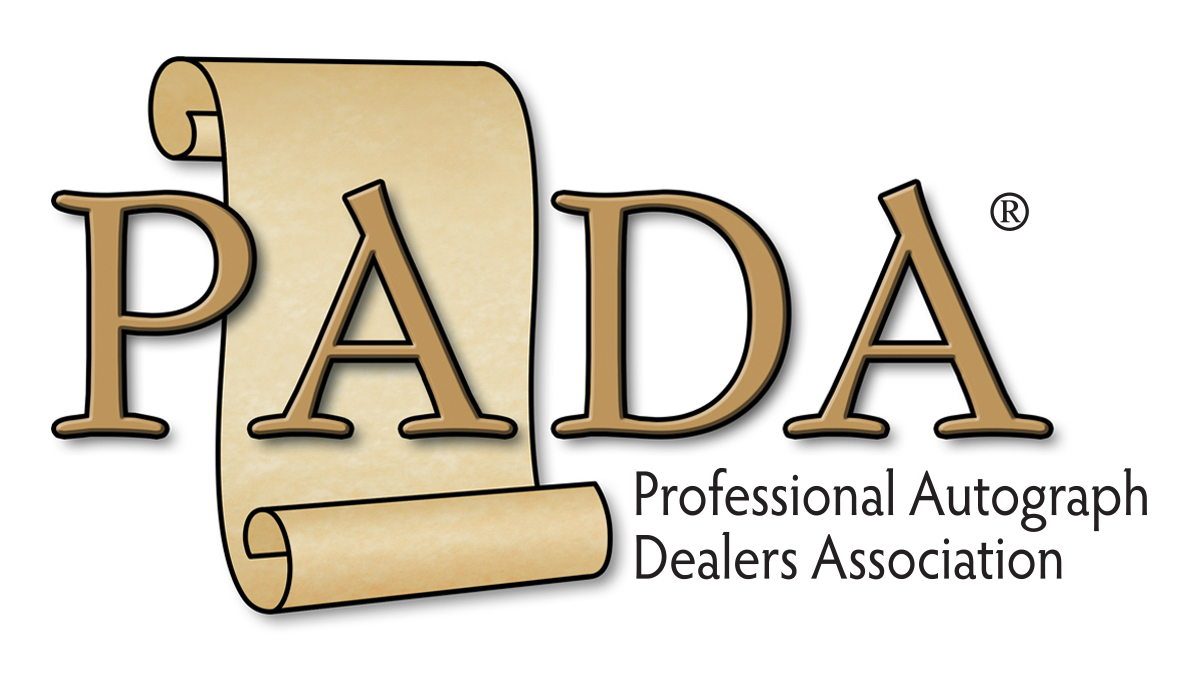2214517
Walther Funk
Richard Walther Darré
Scroll down to see images of the items below the description
Important association Nazi Party biography of Walther Funk, Nazi Minister for Economic Affairs,
with Funk’s letter sending it to Richard Walther Darré, Nazi Minister of Food and Agriculture,
who has signed and dated the book
Walther Funk, 1890–1960. German Reich Minister for Economic Affairs, 1938–1945. Leather-bound book, Walther Funk: Ein Leben für die Wirtschaft (in English, Walther Funk: A Life for the Economy), with tipped-in typed letter signed, Walther Funk, one page, with integral leaf attached, 8” x 9¾”, on blind-embossed, engraved personal stationery of reichsminister walther funk, Berlin, [Germany], August 21, 1940. The book is also signed, R. Walther Darré, by the recipient, Richard Walther Darré, born Ricardo Walther Óscar Darré, 1895–1953, German Reich Minister of Food and Agriculture, 1933–1944.
This is an important association book with accompanying transmittal letter from Funk. He sends a first edition, first printing presentation copy of his official Nazi Party biography to Richard Walther Darré (1895–1953), the Reich Minister of Food and Agriculture (Reichsernährungsminister) and the Reich Farmers’ Leader (Reichsbauernführer). As noted, Darré has signed the book.
This is a World War II-dated book. It was published in Munich by the official Nazi Party Press in 1940, after the war began when Nazi Germany invaded Poland on September 1, 1939. Frank’s transmittal letter is dated August 21, 1940, and Darré has hand-dated his signature in the book 1940. Ultimately, both Funk and Darré would be later convicted of war crimes at Nuremberg after the war.
In the letter, Funk writes, in full: “Dear Party Comrade Darré! / About your very warm and kind congratulations on my 50th birthday and about the wonderful picture of you I was sincerely pleased and thank you very much for your comradely remembrance. / Enclosed I am sending you a book by Dr. Paul Oestreich, in which you may be especially interested in the chapter that deals with my struggle for an agricultural and food policy in your sense long before the seizure of power. I assume that this book will also be well received in the organization of the Reich Food Supply. / I remain in old, sincere solidarity with / Heil Hitler! / Yours . . . ”
An economist, Funk served as the Reich Minister for Economic Affairs for seven years, until the end of World War II. Although his health was poor, the Allies tried him as a major war criminal at Nuremberg. He was convicted on three counts: planning, initiating, and waging wars of aggression; war crimes; and crimes against humanity. He was sentenced to life in prison and served his sentence in Spandau Prison in Berlin, where other imprisoned senior Nazi officials were held, until he was released because of his health in 1957.
Darré, an agronomist, developed an agricultural theory known as Blut und Boden (Blood and Soil), The theory involved the mutual and long-term relationship between a people and the land that they occupy and cultivate; in the context of post-World War I Germany, the theory held that there was a link between the future of the Nordic race and the land. Darré claimed that European culture was created by the Nordic race, as opposed to the “nomadic” Jews, and that German peasants were the driving force of history, the substance of Germanism, and the ultimate custodian of German national uniqueness. Darré became friends with Heinrich Himmler, whom he met in the Artmanen, a right-wing, back-to-the-land movement, and organized farmers in the Nazi Party in the late 1920s. German Führer Adolf Hitler was impressed with with the Blut und Boden ideology, and Darré advanced rapidly through the Nazi Party hierarchy. Hitler made Darré the head of the organization of German farmers in April 1933, and for 12 years Darré was the Reich Farmers’ Leader. In June 1933, Hitler made Darré the Reich Minister for Food and Agriculture. Darré was captured after the end of World War II and tried at Nuremberg in the Ministries Trials, which ran from 1947 to 1949. He was convicted of confiscating property from Polish and Jewish farmers and of ordering the deprivation of food to German Jews, thus deliberately provoking the starvation of civilians. He was imprisoned but released in 1950.
Funk touts this book to Darré for his own accomplishments. In particular, since Darré was steeped in agriculture, Funk emphasizes in this letter his own “struggle for an agricultural and food policy . . . long before the seizure of power” by the Nazi Party. Hitler became the German Chancellor on January 30, 1933, and immediately began to consolidate power in the Nazi Party.
But this book was used against Funk in the Nuremberg War Crimes Trials. The Trial Brief of the American prosecutor, Supreme Court Justice Robert H. Jackson, urging conviction of Funk at Nuremburg cited this book six times. According to the brief, quoting the English translation of this book:
The financial and political support for the Nazis which defendant FUNK secured from industry promoted the campaign of force and terror by which the Nazis seized and consolidated their control of Germany. The importance of FUNK’S general contribution to the conspirators’ accession to power has been described in a book published by the Central Publishing House of the Nazi Party.
“No loss important than FUNK’S accomplishments in the programmatic field in the years 1931 and 1932 was his activity of that time as the Führer’s liaison man to the leading men of the Germany economy in industry, trade, commerce and finance. On the basis of his past work, his personal relations to the German economic leaders were broad and extensive. He was now able to enlist them in the service of Adolf Hitler, and not only to answer their questions authoritatively, but to convince them and win their backing for the Party. At that time, that was terribly important work. Every success achieved meant a moral, political, and economic strengthening of the fighting force of the Party and contributed toward destroying the prejudice that National Socialism is merely a party of class hatred and class struggle.”
Robert H. Jackson, U.S. Chief Counsel, The Individual Responsibility of the Defendant Walther Funk For Crimes Against Peace and Crimes Against Humanity, USA Trial Brief 14, International Military Tribunal (Nuremberg, Germany). In arguing for a guilty verdict against Funk, Jackson concluded the brief:
As Minister of Economics, President of the Reichsbank, and Chief Plenipotentiary for Economics, he was guilty of additional violations of the laws of peace, because he mobilized the German economy for aggressive war, with full knowledge of the conspirators’ plans for aggression. Moreover, in these capacities, and as a member of the Ministerial Council for the Defense and the Central Planning Board, he also actively participated in the waging of aggressive wars. Finally, by virtue of his membership in the Central Planning Board, which formulated and directed the execution of the program for the enslavement, exploitation, and degradation of millions of foreign workers, he bears a special responsibility for the war crimes committed in the execution of that program.
Id. at 31–32.
This is a 5½” x 8¼” hard cover book that to our knowledge was not issued with a dust cover. The cover is embossed with gilt foil stamping on the cover and spine, and the top of the text block is edged in gilt. The book has 120 pages printed in the old German Fraktur typeface. The frontispiece opposite the title page has a bust portrait of Funk facing right, toward the title page, with Funk’s facsimile signature printed beneath the image. The original onion skin paper is intact between the frontispiece and the title page.
The book has wear on the spine, where there has been some rubbing on the gilt imprint at the top and scrapes to the bottom two stripes and part of the gilt Nazi eagle. The bottom corners are bumped, and there is shelf wear through the leather cover on the bottom edges, some to the front edge of the back cover, and considerable wear at the corners. The spine is tight, and the text block is solid and clean except for Darré’s initials in the blank bottom corner of page 87. As noted, Darré has signed and dated the front free endpaper. The integral leaf of Funk’s letter is tipped to the front paste down of the book. Overall, the book is in very good condition.
Funk has signed the letter with a huge 3½” signature in brown fountain pen. The letter is blind embossed with the Nazi eagle at the upper left above Funk’s imprinted name and title. There is light horizontal toning across the top and bottom of the front leaf that affects Funk’s signature, but not particularly noticeably. The letter is in very fine condition.
Provenance: This book and the accompanying transmittal letter have been consigned to us by a major collector of Third Reich autographs, who acquired it directly from Darré’s daughter in 1999. The book and letter have never been offered for sale on the autograph market before.
We reject Nazism and all that it represented. Nevertheless, we offer this book and letter because, although it is despised, the German Third Reich, in which Funk and Darré played an integral role, and which spawned World War II, had an undeniable effect on the course and history of the 20th Century.











